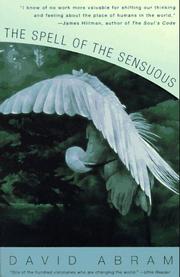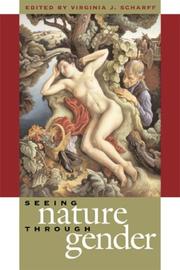| Listing 1 - 10 of 12 | << page >> |
Sort by
|
Book
ISBN: 1138019747 9781138019744 Year: 2016 Publisher: London ; New York : Routledge, Taylor & Francis Group,
Abstract | Keywords | Export | Availability | Bookmark
 Loading...
Loading...Choose an application
- Reference Manager
- EndNote
- RefWorks (Direct export to RefWorks)
Ecofeminism. --- Feminismus. --- Human ecology. --- Humanökologie. --- Women and the environment. --- Ökologie.
Book
ISBN: 9789088909061 9088909067 Year: 2020 Publisher: Leiden : Sidestone Press,
Abstract | Keywords | Export | Availability | Bookmark
 Loading...
Loading...Choose an application
- Reference Manager
- EndNote
- RefWorks (Direct export to RefWorks)
This volume is themed around the interdependent relationship between humans and the environment, an important topic in the work of Corrie Bakels. How do environmental constraints and opportunities influence human behaviour and what is the human impact on the ecology and appearance of the landscape? And what can archaeological knowledge contribute to the current discussions about the use, arrangement and depletion of our (local) environment?
Beziehung. --- Humanökologie. --- Landschaftsbild. --- Mensch. --- Umwelt. --- Verhalten. --- Bakels, Cornelia C.,
Book
ISBN: 9088909083 9789088909085 9789088909078 9088909075 9789088909061 9088909067 Year: 2020 Publisher: Leiden
Abstract | Keywords | Export | Availability | Bookmark
 Loading...
Loading...Choose an application
- Reference Manager
- EndNote
- RefWorks (Direct export to RefWorks)
This volume is themed around the interdependent relationship between humans and the environment, an important topic in the work of Corrie Bakels. How do environmental constraints and opportunities influence human behaviour and what is the human impact on the ecology and appearance of the landscape? And what can archaeological knowledge contribute to the current discussions about the use, arrangement and depletion of our (local) environment?
Paleoecology. --- Beziehung. --- Humanökologie. --- Landschaftsbild. --- Mensch. --- Umwelt. --- Verhalten. --- Bakels, Cornelia C.,
Book
ISBN: 9782757859599 2757859595 Year: 2016 Volume: 517 Publisher: Paris: Seuil,
Abstract | Keywords | Export | Availability | Bookmark
 Loading...
Loading...Choose an application
- Reference Manager
- EndNote
- RefWorks (Direct export to RefWorks)
Les scientifiques nous l’annoncent, la Terre est entrée dans une nouvelle époque : l’Anthropocène. Plus qu'une crise environnementale, nous vivons un basculement géologique d’origine humaine. Comment en sommes-nous arrivés là ? Faisant dialoguer science et histoire, les auteurs revisitent l'histoire globale des derniers siècles au prisme de l'environnement : le manifeste d'une nouvelle génération d'historiens.
Nature --- Climatic changes --- Effect of human beings on --- Anthropozän. --- Humanökologie. --- Klimaänderung. --- Anthropocène. --- Écologie humaine. --- Changement global de l'environnement. --- Nature - Effect of human beings on --- Anthropocène. --- Écologie humaine. --- Humanités environnementales.
Periodical
ISSN: 03007839 15729915 Year: 1972 Publisher: New York, N.Y. : [New York] : Plenum Publishing Corporation, Springer US
Abstract | Keywords | Export | Availability | Bookmark
 Loading...
Loading...Choose an application
- Reference Manager
- EndNote
- RefWorks (Direct export to RefWorks)
Human Ecology publishes papers probing the complex and varied systems of interaction between people and their environment. Contributions examine the roles of social, cultural, and psychological factors in the maintenance or disruption of ecosystems and investigate the effects of population density on health, social organization, and environmental quality. Articles also address adaptive problems in urban environments and the interrelationship between technological and environmental changes.
Sociology --- Human ecology. Social biology --- Human ecology --- Human geography --- Ecologie humaine --- Géographie humaine --- Periodicals --- Périodiques --- Ecology --- Environment --- Human ecology. --- Environmental Sciences --- Ecosystems & Ecology --- Environmental Sciences. --- Ecosystems & Ecology. --- Sociologie --- Menselijke ecologie. Sociale biologie --- Humanökologie --- Zeitschrift --- Online-Ressource --- Mensch --- Ökologie --- Sozialökologie --- Kulturökologie --- Environment, Human --- Human beings --- Human environment --- Ecological engineering --- Nature --- Netzpublikation --- Online-Publikation --- Computerdatei im Fernzugriff --- Online-Dokument --- On-line-Dokument --- On-line-Publikation --- Elektronische Publikation --- Periodikum --- Zeitschriften --- Presse --- Fortlaufendes Sammelwerk --- Social aspects --- Effect of environment on --- Effect of human beings on --- Ökologie --- Sozialökologie --- Kulturökologie --- Humanökologie. --- Zeitschrift. --- Online-Ressource.
Periodical
ISSN: 20537352 Year: 2008 Publisher: Cambridge, UK : The White Horse XL Edizioni,
Abstract | Keywords | Export | Availability | Bookmark
 Loading...
Loading...Choose an application
- Reference Manager
- EndNote
- RefWorks (Direct export to RefWorks)
Human ecology --- Social ecology --- Environmental sciences --- Social aspects --- Environmental science --- Ecology, Social --- Environment, Human --- Human ecology (Social sciences) --- Human environment --- Human ecology. --- Social ecology. --- Science --- Social sciences --- Social aspects. --- Ecology --- Human beings --- Ecological engineering --- Human geography --- Nature --- Effect of environment on --- Effect of human beings on --- Humanökologie. --- Naturwissenschaften. --- Sozialwissenschaften. --- Sozialökologie. --- Umweltwissenschaften.

ISBN: 0679776397 9780679776390 9780307830555 Year: 2017 Publisher: New York : Vintage books,
Abstract | Keywords | Export | Availability | Bookmark
 Loading...
Loading...Choose an application
- Reference Manager
- EndNote
- RefWorks (Direct export to RefWorks)
[In this book, the author] draws on sources as diverse as the philosophy of Merleau-Ponty, Balinese shamanism, Apache storytelling, and his own experience as an accomplished sleight-of-hand magician to reveal the subtle dependence of human cognition on the natural environment. He explores the character of perception and excavates the sensual foundations of language, which - even at its most abstract - echoes the calls and cries of the earth.
Body, Human (Philosophy). --- Corps humain (Philosophie). --- Human body (Philosophy). --- Human ecology. --- Humanökologie. --- Körper. --- Naturphilosophie. --- Perception (Philosophie). --- Perception (Philosophy). --- Philosophie de la nature. --- Philosophie. --- Philosophy of nature. --- Sens (Philosophie). --- Sense (Philosophy). --- Wahrnehmung. --- Écologie humaine. --- Ökologische Philosophie. --- filosofie --- cultuurfilosofie --- lichamelijkheid --- ecologie --- waarneming --- taal --- natuur --- Merleau-Ponty Maurice --- Husserl Edmund --- animisme --- 130.2 --- Philosophical anthropology --- Perception sensible --- Nature

ISBN: 9780700612857 Year: 2003 Publisher: Lawrence : University Press of Kansas,
Abstract | Keywords | Export | Availability | Bookmark
 Loading...
Loading...Choose an application
- Reference Manager
- EndNote
- RefWorks (Direct export to RefWorks)
Extrait de amazon.com : "In thirteen essays that show how gendered ideas have shaped the ways in which people have represented, experienced, and consumed their world, Virginia Scharff and her coauthors explore interactions between gender and environment in history. Ranging from colonial borderlands to transnational boundaries, from mountaintop to marketplace, they focus on historical representations of humans and nature, on questions about consumption, on environmental politics, and on the complex reciprocal relations among human bodies and changing landscapes. They also challenge the "ecofeminist" position by challenging the notion that men and women are essentially different creatures with biologically different destinies."
Body, Human --- Corps humain --- Geschlechterrolle --- Human body --- Human ecology --- Humanökologie --- Mensch --- Philosophie de la nature. --- Philosophy of nature --- Philosophy of nature. --- Rôle selon le sexe --- Sex role --- Sex role. --- Umweltbewusstsein --- Écologie humaine --- Social aspects --- Aspect social. --- Social aspects. --- Philosophy --- Philosophy. --- Philosophie --- Natur --- Soziales --- Aspect de l'environnement. --- Histoire. --- Environmental aspects --- Environmental aspects. --- History --- History. --- Philosophie.
Book
ISBN: 022663888X 9780226427171 022642717X 9780226427201 022642720X 9780226638881 Year: 2017 Publisher: Chicago, Ill. The University of Chicago Press
Abstract | Keywords | Export | Availability | Bookmark
 Loading...
Loading...Choose an application
- Reference Manager
- EndNote
- RefWorks (Direct export to RefWorks)
Osman, the founder of the Ottoman Empire, had a dream in which a tree sprouted from his navel. As the tree grew, its shade covered the earth; as Osman's empire grew, it, too, covered the earth. This is the most widely accepted foundation myth of the longest-lasting empire in the history of Islam, and offers a telling clue to its unique legacy. Underlying every aspect of the Ottoman Empire's epic history-from its founding around 1300 to its end in the twentieth century-is its successful management of natural resources. Under Osman's Tree analyzes this rich environmental history to understand the most remarkable qualities of the Ottoman Empire-its longevity, politics, economy, and society. The early modern Middle East was the world's most crucial zone of connection and interaction. Accordingly, the Ottoman Empire's many varied environments affected and were affected by global trade, climate, and disease. From down in the mud of Egypt's canals to up in the treetops of Anatolia, Alan Mikhail tackles major aspects of the Middle East's environmental history: natural resource management, climate, human and animal labor, energy, water control, disease, and politics. He also points to some of the ways in which the region's dominant religious tradition, Islam, has understood and related to the natural world. Marrying environmental and Ottoman history, Under Osman's Tree offers a bold new interpretation of the past five hundred years of Middle Eastern history.
Natural resources --- Human ecology --- Ecology --- Environment, Human --- Human beings --- Human environment --- Ecological engineering --- Human geography --- Nature --- National resources --- Resources, Natural --- Resource-based communities --- Resource curse --- History. --- Social aspects --- Effect of environment on --- Effect of human beings on --- Economic aspects --- Egypt --- Turkey --- Ottoman Empire, 1288-1918 --- History --- History of Africa --- anno 1700-1799 --- anno 1800-1899 --- Human ecology. --- Humanökologie. --- 1288-1918. --- Egypt. --- Middle East. --- Turkey. --- Ägypten. --- Osmanisches Reich.
Book
ISSN: 11516461 ISBN: 9782359251081 2359251082 Year: 2015 Publisher: Paris: Les empêcheurs de penser en rond/La Découverte,
Abstract | Keywords | Export | Availability | Bookmark
 Loading...
Loading...Choose an application
- Reference Manager
- EndNote
- RefWorks (Direct export to RefWorks)
James Lovelock n'a pas eu de chance avec l'hypothèse Gaïa. En nommant par ce vieux mythe grec le système fragile et complexe par lequel les phénomènes vivants modifient la Terre, on a cru qu'il parlait d'un organisme unique, d'un thermostat géant, voire d'une Providence divine. Rien n'était plus éloigné de sa tentative. Gaïa n'est pas le Globe, n'est pas la Terre-Mère, n'est pas une déesse païenne, mais elle n'est pas non plus la Nature, telle qu'on l'imagine depuis le XVIIe siècle, cette Nature qui sert de pendant à la subjectivité humaine. La Nature constituait l'arrière-plan de nos actions. Or, à cause des effets imprévus de l'histoire humaine, ce que nous regroupions sous le nom de Nature quitte l'arrière-plan et monte sur scène. L'air, les océans, les glaciers, le climat, les sols, tout ce que nous avons rendu instable, interagit avec nous. Nous sommes entrés dans la géohistoire. C'est l'époque de l'Anthropocène. Avec le risque d'une guerre de tous contre tous. L'ancienne Nature disparaît et laisse la place à un être dont il est difficile de prévoir les manifestations. Cet être, loin d'être stable et rassurant, semble constitué d'un ensemble de boucles de rétroactions en perpétuel bouleversement. Gaïa est le nom qui lui convient le mieux. En explorant les mille figures de Gaïa, on peut déplier tout ce que la notion de Nature avait confondu : une éthique, une politique, une étrange conception des sciences et, surtout, une économie et même une théologie
Gaia hypothesis --- Ecology --- Gaïa, Hypothèse --- Ecologie --- Biosphere --- Biology --- Global environmental change --- Philosophy --- Gaïa, Hypothèse --- Philosophie de la nature --- Philosophie de l'environnement --- Hypothèse de Gaïa --- Anthropocène --- Écologie humaine --- Philosophie --- Philosophie de la nature. --- Philosophie de l'environnement. --- Hypothèse de Gaïa. --- Anthropocène. --- Philosophie. --- Menselijke ecologie --- Philosophy of nature --- Anthropocene --- Filosofie --- Gaia hypothesis. --- Philosophy of nature. --- Nature in literature. --- Climatic changes --- Hypothèse Gaïa. --- Nature dans la littérature. --- Climat --- Gaia-Hypothese. --- Humanökologie. --- Umweltbewusstsein. --- Écologie humaine. --- Changement global de l'environnement. --- Climat - Changements. --- Philosophy. --- Changements --- Biology - Philosophy
| Listing 1 - 10 of 12 | << page >> |
Sort by
|

 Search
Search Feedback
Feedback About UniCat
About UniCat  Help
Help News
News